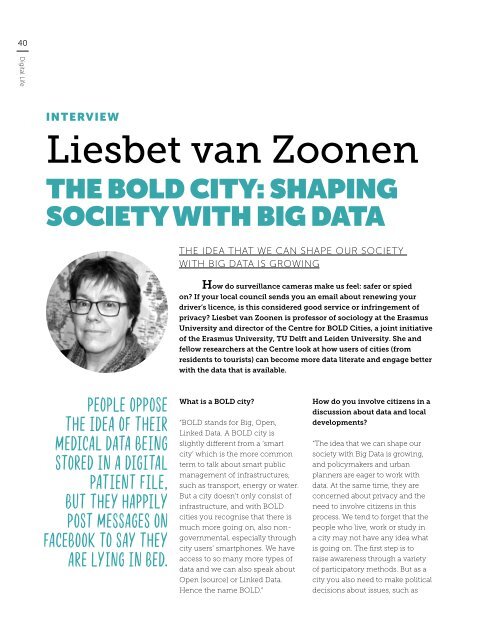trend-report-dps-web-version
You also want an ePaper? Increase the reach of your titles
YUMPU automatically turns print PDFs into web optimized ePapers that Google loves.
40<br />
41<br />
Digital Life<br />
INTERVIEW<br />
Liesbet van Zoonen<br />
THE BOLD CITY: SHAPING<br />
SOCIETY WITH BIG DATA<br />
people oppose<br />
the idea of their<br />
medical data being<br />
stored in a digital<br />
patient file,<br />
but they happily<br />
post messages on<br />
Facebook to say they<br />
are lying in bed.<br />
THE IDEA THAT WE CAN SHAPE OUR SOCIETY<br />
WITH BIG DATA IS GROWING<br />
How do surveillance cameras make us feel: safer or spied<br />
on? If your local council sends you an email about renewing your<br />
driver’s licence, is this considered good service or infringement of<br />
privacy? Liesbet van Zoonen is professor of sociology at the Erasmus<br />
University and director of the Centre for BOLD Cities, a joint initiative<br />
of the Erasmus University, TU Delft and Leiden University. She and<br />
fellow researchers at the Centre look at how users of cities (from<br />
residents to tourists) can become more data literate and engage better<br />
with the data that is available.<br />
What is a BOLD city?<br />
“BOLD stands for Big, Open,<br />
Linked Data. A BOLD city is<br />
slightly different from a ‘smart<br />
city’ which is the more common<br />
term to talk about smart public<br />
management of infrastructures,<br />
such as transport, energy or water.<br />
But a city doesn’t only consist of<br />
infrastructure, and with BOLD<br />
cities you recognise that there is<br />
much more going on, also nongovernmental,<br />
especially through<br />
city users’ smartphones. We have<br />
access to so many more types of<br />
data and we can also speak about<br />
Open [source] or Linked Data.<br />
Hence the name BOLD.”<br />
How do you involve citizens in a<br />
discussion about data and local<br />
developments?<br />
“The idea that we can shape our<br />
society with Big Data is growing,<br />
and policymakers and urban<br />
planners are eager to work with<br />
data. At the same time, they are<br />
concerned about privacy and the<br />
need to involve citizens in this<br />
process. We tend to forget that the<br />
people who live, work or study in<br />
a city may not have any idea what<br />
is going on. The first step is to<br />
raise awareness through a variety<br />
of participatory methods. But as a<br />
city you also need to make political<br />
decisions about issues, such as<br />
which groups of citizens do you want to involve, how<br />
should you talk to them about changes, and what<br />
would be the preferable outcome of these interactions?<br />
Our research will provide the resources for such<br />
discussions.”<br />
The Centre for BOLD cities is located in Rotterdam.<br />
Is the city’s municipality making these steps right<br />
now?<br />
“In Rotterdam, there are a relatively high number<br />
of people who don’t have any experience with<br />
computers. One of the things we do is take people<br />
out on data-walks. We show them, for instance, what<br />
is happening when you pass a surveillance camera,<br />
which is relatively well-known technology. We<br />
also show them which data streams are completely<br />
invisible, but crucial, to everyday life in the city: think<br />
of air-quality sensors or smart garbage bins. We also<br />
discuss questions like who owns the data. Could you<br />
get access to it – and would you want to?”<br />
How do people respond to their data being<br />
collected?<br />
“On the one hand, people are concerned about their<br />
privacy, but on the other hand they are happy to<br />
share it. For example, people oppose the idea of their<br />
medical data being stored in a digital patient file, but<br />
they happily post messages on Facebook to say they<br />
are lying in bed. People fear that the government wants<br />
to collect their data, but they don’t have any objections<br />
against supermarket discount-cards that track their<br />
shopping habits. This is called the Privacy Paradox.”<br />
What about protecting people’s identity and<br />
identity management?<br />
“People do not think of themselves as series of data:<br />
we feel we have been shaped by many different<br />
experiences and are more than just numbers. From<br />
a data perspective, identity management revolves<br />
around the question: How do we shape online<br />
identities in a way that they can be used for the actual<br />
authentication of a person and how can we secure this<br />
data? The Dutch government, for instance, is in the<br />
middle of renovating their DigiD system to be able to<br />
offer more diverse possibilities for identification. Big<br />
businesses are also searching for the most secure and<br />
easy way of identification and authentication: from<br />
face-to-face encounters to facial recognition based on<br />
your smile.”<br />
Which groups in our society will encounter<br />
the most problems with these new ways of<br />
identification? Isn’t there a fear that, for instance,<br />
elderly people cannot keep up with these<br />
developments?<br />
“You will always have a small percentage of people<br />
who cannot keep up regardless of the technology, and<br />
you need to be sensitive to who they might be. While<br />
you might think that the elderly will struggle, young<br />
people too may not be very capable, especially in their<br />
interaction with the government. In Denmark, the<br />
government noticed that adolescents didn’t respond to<br />
emails or other forms of digital communication from<br />
the government. Why? Because they did not see the<br />
point. You can’t assume anything in this field.”<br />
You will always have a small percentage of people who<br />
cannot keep up regardless of the technology, and you need<br />
to be sensitive to who theY might be.<br />
Digital Life





